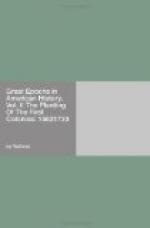Cotton Mather took the oldest “afflicted” girl to his house, where she dexterously played upon his self-conceit to stimulate his credulity. She satisfied him that Satan regarded him as his most terrible enemy, and avoided him with especial awe. When he prayed or read in the Bible, she was seized with convulsion fits. When he called to family devotion she would whistle, and sing, and scream, and pretend to try to strike and kick him; but her blows would be stopt before reaching his body, indicating that he was unassailable by the Evil One. Mather published an account of these transactions,[3] with a collection of other appropriate matter. The treatise circulated not only in Massachusetts, but widely also in England, where it obtained the warm commendation of Richard Baxter; and it may be supposed to have had an important effect in producing the more disastrous delusion which followed three years after. The Goodwin children soon got well: in other words, they were tired of their atrocious foolery; and the death of their victim gave them a pretense for a return to decent behavior....
Martha Corey and Rebecca Nourse were cried out against. Both were church-members of excellent character; the latter seventy years of age. They were examined by the same magistrates, and sent to prison, and with them a child of Sarah Good, only four or five years old, also charged with diabolical practises. Mr. Parris preached upon the text, “Have not I chosen you twelve, and one of you is a devil?” Sarah Cloyse, understanding the allusion to be to Nourse, who was her sister, went out of church, and was accordingly cried out upon, examined, and committed. Elizabeth Procter was another person charged. The Deputy-Governor and five magistrates came to Salem for the examination of the two prisoners last named. Procter appealed to one of the children who was accusing her. “Dear child,” she said, “it is not so; there is another judgment, dear child:” and presently they denounced as a witch her husband, who stood by her side. A week afterward warrants were issued for the apprehension of four other suspected persons; and a few days later for three others, one of whom, Philip English, was the principal merchant of Salem. On the same day, on the information of one of the possessed girls, an order was sent to Maine for the arrest of George Burroughs, formerly a candidate for the ministry at Salem Village, and now minister of Wells. The witness said that Burroughs, besides being a wizard, had killed his first two wives, and other persons whose ghosts had appeared to her and denounced him....




